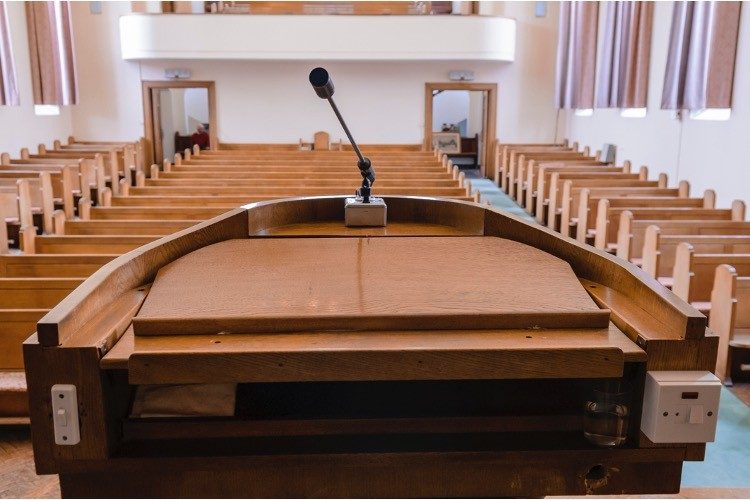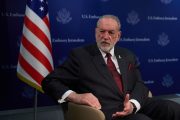
The government has officially given its blessing to church leaders who want to endorse candidates from the pulpit, removing a decades-old censorship cudgel that was introduced by one of the most knowingly corrupt politicians in American history.
The National Religious Broadcasters and two Texas churches sued the Internal Revenue Service (IRS) last year, arguing that the Johnson Amendment violated freedom of speech and freedom to exercise religion. The IRS has now agreed that churches can air political endorsements without danger of losing their tax-exempt status
In a recent court filing that concluded the lawsuit on Monday, the IRS likened a church preacher who endorses a candidate to a “a family discussion,” aligning with biblical doctrine that says churchgoers are brothers and sisters in Christ. The court filing also said this new official recognition doesn’t violate any rules and therefore does not threaten a church’s tax-exempt status. More from the court document:
Communications from a house of worship to its congregation in connection with religious services through its usual channels of communication on matters of faith do not run afoul of the Johnson Amendment as properly interpreted. This interpretation of the Johnson Amendment is in keeping with the IRS’s treatment of the Johnson Amendment in practice.
Johnson Amendment
The Johnson Amendment is a 1954 tax code change sponsored by then-Democrat Texas Senator Lyndon Johnson. He introduced the amendment in a re-election year over concern that non-profits were supporting his primary opponent Gary Cass, according to the American Center for Law and Justice (ACLJ). The amendment, which passed with unanimous consent and without debate, barred churches from getting involved in political campaigns. It restricted 501(c)(3) organizations from “participat[ing] in, or interven[ing] in (including the publishing or distributing of statements), any political campaign on behalf of (or in opposition to) any candidate for public office.”
Until Monday, the official IRS position was that public comments from church leaders about candidates, whether favorable or not, were not allowed, because it would be considered campaigning. While advocates of the rule have complained that it’s been loosely enforced, it has without question prevented pastors from voicing biblical judgment regarding political figures. Church leaders, especially those with large platforms, have rarely endorsed or spoken against candidates, even the ones who promoted values overtly antithetical to biblical teachings, including abortion and homosexuality. The idea of losing their tax-exempt status has served as an intimidating prospect in a time when many church budgets are hanging by a thread.
Political Tradition
Before the Johnson Amendment, the American Church had a tradition of political activity going back to pre-Independence era. As ACLJ noted:
This nation has a rich and welcomed history of turning to religious leaders and churches during the debate of the great moral issues of the day. The election sermon was once very common, with pastors acknowledging our religious heritage and addressing key issues of their day. During the Revolutionary era, pastors in the pulpit encouraged dissent and called for freedom — the prelude to the birth of our country — a country that cherishes free speech. That freedom is as important today as it was then.
Black-Robed Regiment
ACLJ is likely referring to a group of influential Protestant preachers who spoke in favor of and supported the Patriot cause known as the Black-Robed Regiment. The name came about because of the black robes the ministers wore when preaching. One of the most famous of those preachers was Peter Muhlenberg from Virginia. FreedomCivics documents Muhlenberg’s pulpit behavior on Sunday morning, January 21, 1776:
In his black clerical robe, the traditional dress of 18th century preachers, Muhlenberg preached from the third chapter of Ecclesiastes. He read how there is a time for all things. There’s a time to be born and a time to die, a time to plant and a time to harvest. Then His voice began to rise as he said: ‘There’s a time of war, and a time of peace. There is a time for all things, a time to preach and a time to pray. But there is also a time to fight, and that time has now come!’ Then he did something his congregation did not expect. He removed his clerical robe revealing a colonial officer’s uniform beneath. Pastor Muhlenberg then stepped down from his pulpit and challenged the men of his congregation to join him in the fight for liberty.
Days before Muhlenberg’s dramatic sermon, General George Washington commissioned him to create a regiment of men from the area. That Sunday morning, as he walked down the aisle, “a drum began to roll outside” and “one by one, the men of Muhlenberg’s congregation filed out of the auditorium and volunteered to follow their courageous pastor.”
Other members of the Black-Robed Regiment included Presbyterian minister John Witherspoon and Boston minister Jonathan Mayhew. These ministers supported American independence because they saw it as the best defense of religious liberty. The colonies were, after all, established by a collection of religious groups who shared a common experience: persecution in Europe. The Black-Robed Regiment was an especially sharp thorn in the side of the British because it made it more difficult to preserve loyalty to the Crown among the colonists.
Two-hundred and fifty years later, the American Church is unrecognizable from that of the Independence Era. And the Johnson Amendment has been partly to blame.
Modern Resistance
Nevertheless, some modern day preachers and faith leaders have for years refused to toe the IRS’s line. In September 2008, 33 American pastors delivered political sermons from the pulpit in protest against the Johnson Amendment. Southern Baptist pastor Robert Jeffress once called the law an “assault by government on religious liberty.”
Pastor Paul Blair of Oklahoma has persistently dared the government to come down on him after taking actions that violated the Johnson Amendment. In May 2023, he invited mayoral candidate Brian Shellem to speak at the church he pastored and asked the congregation to vote for him. A news report on the matter lifted a great deal of text from the IRS website in an attempt to make the point that Blair’s church was breaking the law. The report notes that “For many years, Blair has faced criticism for blurring the lines between political activity and proselytization at his church.”
In 2010, Americans United for Separation of Church and State tried to influence the IRS to investigate Blair because he used his tax-exempt religious organization, Reclaiming Oklahoma for Christ, to support a state representative for re-election. Blair told parishioners in an email to support a certain candidate and prevent the “homosexual lobby” from taking over the seat.
Blair spoke at the annual 2024 leadership conference put on by the parent company of this magazine, The John Birch Society. In his presentation, he asked the audience:
Is Jesus just the lord of Sunday mornings or is Jesus the lord of all? If Jesus is the lord of all, how can you, as a pastor, say there are certain things that I can’t talk about in church? That is a contradiction. If Jesus is the lord of all, then there is nothing that I can’t talk about in church.
Blair also said that it is impossible to be a Democrat and follower of Christ at the same time. He cites Democratic platform points antithetical to biblical values, including abortion, “the mutilation of children” (referring to trans surgeries for minors), and the depravity mob gathered under the LGBTQ umbrella.
Follow the Bible
Many Christians believe the Johnson Amendment has played a significant role in the erosion of American society. Included in those views is the belief that said erosion was the true motivation behind the rule. And while that may be true, it also raises the question of what the Bible says about when to follow man’s laws and when to skirt them.
How would the Black-Robed Regiment have reacted to the Johnson Amendment — or to any other rule, law, or dictate -past or future — that restricts what pastors can say?





